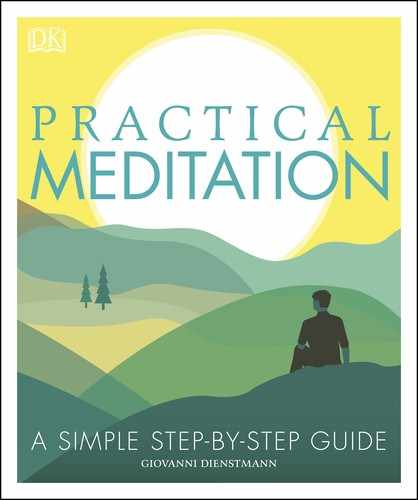MEDITATION MYTH BUSTING
Common questions and misconceptions
As you start your meditation journey, it’s normal to have lots of questions about the practice, or even about what exactly meditation is. Getting to know a bit more about it and dispelling some widespread myths will open up your path of discovery.
Q DOES MEDITATION REALLY WORK?
Meditation is an ancient practice that has been helping people be happier, be more peaceful, and live better lives for millennia (see here). Its many benefits to your mind and body have now been proven by science (see here).
Q IS MEDITATION RELIGIOUS?
Though some techniques are religious by nature, meditation itself is an exercise for your mind. As long as you follow secular techniques, you don’t need to hold any particular beliefs, so it does not conflict with any religion, nor does it conflict with atheism.
Q IS MEDITATION THE SAME AS MINDFULNESS?
No—mindfulness can be taken to mean a number of different things. For example, mindfulness can be a practice of following the breath or of observing whatever is arising in your present moment experience. Taken in this way, mindfulness is one of many types of meditation (see here). On the other hand, mindfulness can also refer to the qualities of awareness, remembrance, and watchfulness. In this sense, mindfulness is a skill involved in all types of meditation and which can be practiced in many daily life activities (see here).
Q ARE TAI CHI AND YOGA FORMS OF MEDITATION?
Tai Chi and Yoga are forms of body-mind exercises that have a contemplative component to them. While they are not exactly forms of meditation on their own, they can enhance your practice and can be performed with a meditative spirit (see here and here). They also share some benefits with meditation, as they are slow and mindful by nature.
Q DO I NEED A CALM MIND IN ORDER TO MEDITATE?
No. Just as you don’t need to be strong to go to the gym, you don’t need a certain state of mind to be able to meditate. Meditation helps you achieve calmness of mind.
Q IS MEDITATION DIFFICULT?
As a process, meditation is simple and anyone can practice it. The state of meditation, as it is traditionally defined, is more difficult to achieve and happens only when the mind is perfectly focused on a single object. However, very few people achieve this consistently, and you can still access the many benefits of meditation without it.
Q DO I NEED TO STOP OR EMPTY MY MIND IN MEDITATION?
You cannot stop your mind as an act of will. Instead, in meditation, you intently focus your mind on one thing to the exclusion of all others (see here). As your mind becomes fully engaged in one thing, your thinking is redirected and your mind becomes quiet and still. However, it can take years of practice to achieve this state, so it is not something that you need to consider in the beginning.
Q IS MEDITATION ALL ABOUT RELAXATION AND LIVING IN THE MOMENT?
Relaxation and present moment awareness are crucial to meditation—without them, you cannot truly meditate—but these are just the first steps. Depending on which technique you follow, meditation also applies your mind in different ways to develop awareness, focus, introspection, and insight. Meditation starts with relaxation but is ultimately an exercise to help you better understand, control, and expand your mind.
Q IS THERE A RIGHT OR WRONG WAY TO MEDITATE?
Just as there are right and wrong ways to exercise or eat well, there are specific techniques that need to be followed in meditation, which unfold into particular experiences and stages of practice. Without proper guidance, you may experience some relaxation through meditation, but you will make no progress beyond that point.
“Having an open and curious mind helps you get the most out of your meditation practice.”
Q IS DEEP RELAXATION IN MEDITATION LIKE SLEEP?
In deep sleep, there is total unawareness, whereas meditation is a state of heightened awareness. Meditation also helps you to relax consciously and develop your focus, while sleep simply gives you rest and restoration.
Q IS IT SELF-INDULGENT TO SPEND TIME MEDITATING?
No. Like sleeping and eating, meditating is essential to staying healthy, balanced, and well. Only when you are in your best state can you truly serve others and engage in unselfish activities effectively without burning out. The positive state of mind you achieve from meditation will be greatly beneficial to those around you.
Q IS MEDITATION A WAY TO RUN AWAY FROM LIFE?
Quite the opposite: distraction is a way of running away from life. Meditation cuts away all distraction and places you in front of yourself. Meditation also teaches you to arrive at a state that is deeper than all your problems. While some people may want to use this as an escape strategy, that is not what meditation itself teaches.
Q WILL MEDITATION MAKE ME SLOW, APATHETIC, AND PASSIVE?
No, but your attitude toward the practice and the philosophies around it might have this effect on you. Meditation gives you tranquility and creates more pause and clarity in your life. You will become less restless and less dominated by your emotions. This may make you appear different in the eyes of others, but in reality, the skills developed through meditation enhance your ability to act wisely and effectively in life.
Q DO I NEED TO BURN INCENSE, CHANT “OM,” AND WEAR SPECIAL CLOTHES?
No. Some people do find it useful to establish some form of ritual around their practice, as this can help to ground and focus the mind (see here), but this is not essential to the process of meditation itself.
Q DO I NEED TO SIT IN A SPECIAL POSTURE IN ORDER TO MEDITATE?
Specific seated postures are recommended for most meditation techniques, as they can have a powerful effect on your state of mind. You can choose from several variations to suit your needs (see here).
Q DO I NEED TO CLOSE MY EYES TO MEDITATE?
Not always. Closing your eyes helps you to focus your attention inward, but some meditation techniques, such as Zazen and Trataka, are done with your eyes open, which has the advantage of helping you to be more present and alert.
Q HOW SHOULD I CHOOSE A MEDITATION TECHNIQUE?
There is no single style of meditation that is superior to all others. Different approaches work for different people—it is simply a matter of experimenting with different techniques and seeing which work best for you. This will also depend on your goals for the practice (see here), so it helps to gain clarity around what you seek from meditation first. Bear in mind that as your needs and goals change in life, you may find that you will benefit from different techniques at different times.
Q HOW LONG SHOULD I MEDITATE FOR?
It depends on the benefits you seek and how interested you are in the practice, but it is generally best to start small. Don’t overstretch your motivation to practice; instead, increase the length of your session as you feel the need (see here).
Q HOW OFTEN SHOULD I MEDITATE?
To get the most out of meditation, you need to meditate every day, ideally at the same time and in the same place (see here). You can also introduce meditation and meditative activities into your daily life (see here).
Q DO I NEED A MEDITATION TEACHER?
You don’t need a teacher to get started with meditation, especially if you primarily seek its health and well-being benefits. But as your practice deepens, you may feel you need more guidance. A teacher can help improve your technique, tackle obstacles (see here), and build meditation more fully into your life (see here).
A QUESTIONING MINDSET
Having an open and questioning mind is an important part of meditation. For example:
AWARENESS. Meditation invites you to ask yourself how your body is feeling and what state your mind is in, and to question thoughts and actions that are usually automatic. This develops greater awareness, a crucial skill in meditation.
THE BIGGER QUESTIONS. Meditation encourages us to ask difficult questions, such as “Who am I?” and “What is the meaning of life?”
GOING DEEPER. By fostering curiosity around your practice—researching more about it or asking a meditation teacher questions—you will connect more deeply with meditation.
“The best mindset for meditation is one of nonjudgment, curiosity, patience, and perseverance.”

